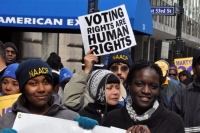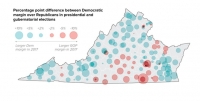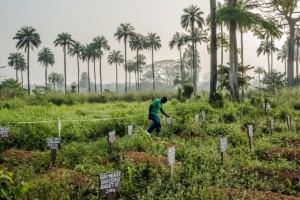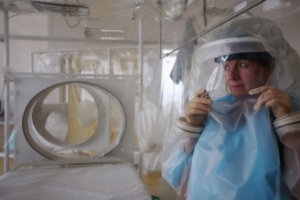
- Home
- About
- Campaigns
- PDA Radio
- Contact Us
- Downloads
- Join Us
- Donate
- Events
- Benefit Kitchen
Aid workers: Life and death in the time of Ebola
Alison Schafer is a trained psychologist working with the international humanitarian agency World Vision.
On January 12, she went to Sierra Leone from her home in Melbourne to work on the social, emotional and psychological effects of the Ebola epidemic, which during the past year has killed more than 10,250 people in Guinea, Liberia and Sierra Leone.
How Ebola Roared Back
For a fleeting moment last spring, the epidemic sweeping West Africa might have been stopped. But the opportunity to control the virus, which has now caused more than 7,800 deaths, was lost.
Doctors in Scotland confirm country's first Ebola case
A health worker who just returned to Scotland from Sierra Leone has been diagnosed as the country's first Ebola case, Scottish authorities said Monday. The Scottish government said on its website that infectious-disease procedures have been put into effect, and the patient has been isolated and is being treated on the Gartnavel Hospital campus in Glasgow.
Ebola crisis: Huge risk of spread - UN's Tony Banbury
The head of the UN Ebola response mission in West Africa has told the BBC there is still a "huge risk" the deadly disease could spread to other parts of the world. Tony Banbury declined to say if targets he had set in the fight against Ebola, to be achieved by Monday, had been met.
Latest News
-
Trump administration's voter suppression attempts ahead of midterms are not only 'morally wrong,' they're illegal +
 Imagine going to the polls on Election Day and discovering that your ballot could be collected and reviewed by the… Read More
Imagine going to the polls on Election Day and discovering that your ballot could be collected and reviewed by the… Read More
-
ACLU Blueprints Offer Vision to Cut US Incarceration Rate in Half by Prioritizing 'People Over Prisons' +
 ACLU Blueprints Offer Vision to Cut US Incarceration Rate in Half by Prioritizing 'People Over Prisons' Read More
ACLU Blueprints Offer Vision to Cut US Incarceration Rate in Half by Prioritizing 'People Over Prisons' Read More
-
As Florence Makes Landfall, Poorest Once More Likely to Suffer Most From Storm's Destruction +
 "These disasters drag into the light exactly who is already being thrown away," notes Naomi Klein Read More
"These disasters drag into the light exactly who is already being thrown away," notes Naomi Klein Read More
-
How about some good news? Kansas Democratic Representative advances bill for Native Peoples. +
 How about some good news? Kansas Democratic Representative advances bill for Native Peoples. Read More
How about some good news? Kansas Democratic Representative advances bill for Native Peoples. Read More
-
How One Dying Man Changed The Debate About The Tax Bill +
 What mattered was that he showed up — that he put himself in front of the people whose opinions on… Read More
What mattered was that he showed up — that he put himself in front of the people whose opinions on… Read More
-
Democrats Just Won a Major Victory in Virginia +
 On a night of Democratic victories, one of the most significant wins came in Virginia, where the party held onto… Read More
On a night of Democratic victories, one of the most significant wins came in Virginia, where the party held onto… Read More
-
Repealing the Jim Crow law that keeps 1.5 million Floridians from voting. +
 A seismic political battle that could send shockwaves all the way to the White House was launched last week in… Read More
A seismic political battle that could send shockwaves all the way to the White House was launched last week in… Read More
-
Nuclear Weapons: Who Pays, Who Profits? +
 In an interview with Reuters conducted a month after he took office, Donald Trump asserted that the U.S. had “fallen… Read More
In an interview with Reuters conducted a month after he took office, Donald Trump asserted that the U.S. had “fallen… Read More
-
Sessions issues sweeping new criminal charging policy +
 Attorney General Jeff Sessions overturned the sweeping criminal charging policy of former attorney general Eric H. Holder Jr. and directed… Read More
Attorney General Jeff Sessions overturned the sweeping criminal charging policy of former attorney general Eric H. Holder Jr. and directed… Read More
- 1
- 2



